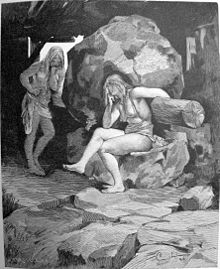Gróttasöngr
The Gróttasöngr (also Grottasöngr ; Old Icelandic : Grottis Gesang ) is an Old Norse poetry. The text is handed down in one of the manuscripts of Snorri Sturluson's Snorra-Edda and is counted among the poems of the Lieder-Edda . It consists of a prose introduction, which tells the story, as well as the poem of twenty-two stanzas of different lengths.
The material also survived as a Scandinavian fairy tale, which Peter Christen Asbjørnsen (1812–1885) and Jørgen Moe (1813–1882) included in their collection “Norske Folkeeventyr” under the title “Why the sea is salty”. A modern reception of the material was “Den nya Grottesången” by the Swedish writer Viktor Rydberg (1828–1895), an anti-capitalist poem that received great attention in Sweden at the beginning of the 20th century.
content
In the introduction, Snorri introduces the ancestors of the Danish legend king Fróði from the family of the Skioldinger , starting with Skjöldr , who gave the dynasty its name. Skjöldr's son and successor as King of Denmark was Friðleifr, whose son and successor was Fróði. This happened at the time when Augustus Roman Emperor was, and on earth the Augustan peace prevailed, which was called in Scandinavia Fróðis peace. The north was so peaceful at the time that no one would harm anyone, even if he met the murderer of his father or brother, whether he was free or imprisoned. There were no robbers, and a gold ring could lie on the moor near Jelling without being stolen.
King Fróði visited Sweden and its king Fjölnir. From Fjölnir he bought two slaves of the giant line named Fenja and Menja . There were two millstones in Denmark that were so heavy that no one could use them. Fróði had received this mill called "Grótti" from a man called Hengikjopt. The special thing about Grótti was that this mill could grind whatever the operator wanted.
Fróði forced Fenja and Menja to grind gold, peace and prosperity for him on the Grótti. In doing so, he did not allow them to rest any longer than for the time of his song or the call of a cuckoo . While Fróði slept, the giantesses retaliated by turning the mill and singing the actual Gróttasöngr. Fenja and Menja milled an enemy army under the leader Mysing, the Fróðis realm invaded. King Fróði and many of his men fell, then the attackers sailed away with rich booty and the two giantesses. This was the end of Fróði's peace.
Mysing also took the Grótti with him and ordered the giantesses to grind salt for him . When the giantesses asked around midnight whether he had enough salt, he asked them to continue grinding. Mysing's ships sank, overloaded with the salt that the giantesses were bringing in. At the point of the sinking a vortex formed where the water falls through the eyes of the rotating millstones, on which Fenja and Menja continue to grind salt. This is the reason why sea water is salty.
Geographical
In the Pentland Firth , between the islands of Stroma and Swona, there is the eddy current "Swelki", whose name is derived from the Old Norse word svelgr (sea mill) and which a regional legend links with the Grótti. The name Maelstrom des Moskenstraumen in the Lofoten archipelago also conveys the idea of a rotating millstone.
literature
- Rudolf Simek: Religion and Mythology of the Teutons. WBG, Darmstadt 2003.
